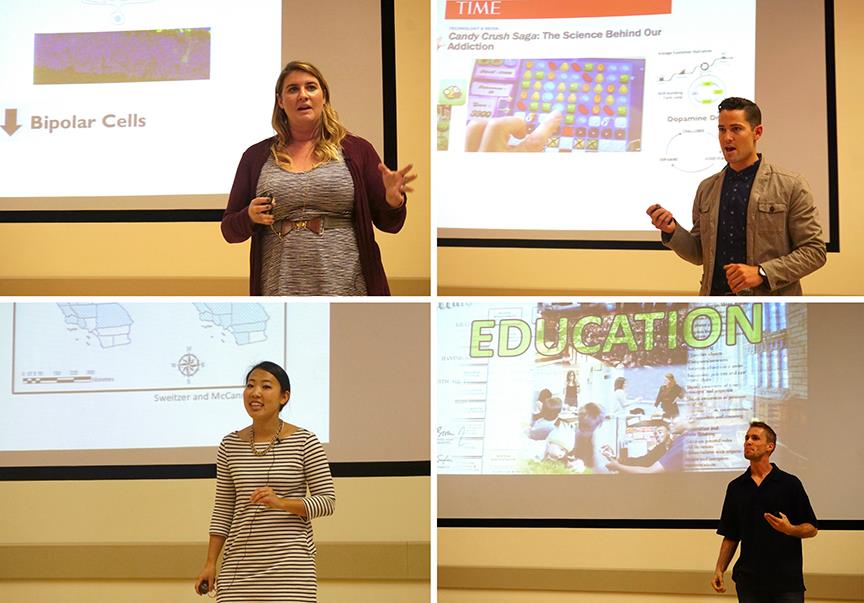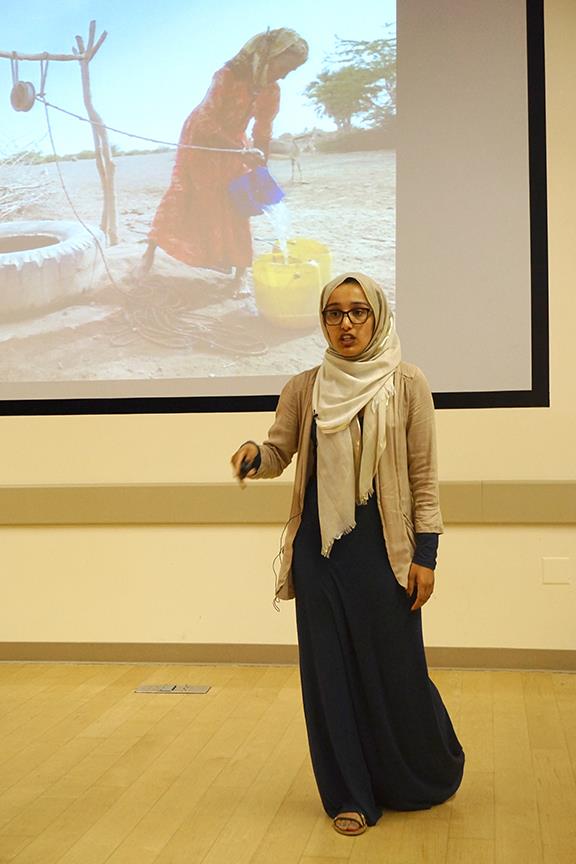Top Stories
Find out which four presenters advanced from our second semifinal round to the Final Round on Friday!


In Tuesday's round of the Grad Slam Semifinals, 11 Judges' Choice winners from the preliminary rounds competed for four coveted spots in the Grad Slam Finals on Friday. Here are the four winners from this round, as well as Steph's Superlatives:
Winners
Elizabeth Hiroyasu
Gokh Amin
Katherine Millage
Savannah Dearden
Steph's Superlatives
- Best use of fluorescent colors: Amanda Kautzman
- Best reason to cave in to game addictions: Brett Carpenter
- Most audience participation: Joshua Kuntzman
- Most "concrete" idea to address climate change: Nathan Prisco
- Best (and most dangerous) prop: Phillip Rogers
- Most ambitious title: Rohan Bhandari ("Particle Physics in One Sentence")
View photos and read synopses of all the talks fromâ Semifinal Round 2 below.

Semifinal Round 2
Tuesday, April 12 | 3 to 4 p.m.
SRB Multipurpose Room

Amanda Kautzman | Psychological & Brain Sciences
Building a Retina from the Genome Up
Genes are responsible for determining the characteristics of organism. The retina is a part of our central nervous system and many genes control its development. Some genes will determine how many cells, or neurons, will make up the final composition of the retina, which is necessary for our ability to see. My project will reveal how the gene Xkr8 determines the precise number of cells that contribute to a functioning retina.
Brett Carpenter | Technology Management
The Behavioral Science of Water Consumption: A Venture for Drought Decision Architecture
I will be discussing the field of consumption data disaggregation - how small sensors developed by our New Venture Competition team stand to provide powerful information to modify consumption behaviors, reduce our impact on the environment, and spur a culture of knowing.
Elizabeth Hiroyasu | Bren School of Environmental Science & Management
Fun Facts about Wild Pigs and Why We Should Care about Them
This talk will communicate the impacts that wild pigs have on our ecosystems and provide compelling evidence for better management strategies.
Gokh âAmin | Global Studies
Seven Years, Three Yemens: The Empowerment and Disenfranchisement of Yemeni Women Between 1989 and 1995
 In 1990, the People's Democratic Republic of Yemen and the Yemen Arab Republic unified to form the Republic of Yemen. This unification of the Middle East's only communist government and a military-tribal polity would have drastic consequences for Yemenis residing in the new state. This study seeks to understand the situation of Yemeni women âbefore and after the unification, asking what explains the institutional disenfranchisement and growing social exclusion of women in Yemen between the years 1989 and 1995.
In 1990, the People's Democratic Republic of Yemen and the Yemen Arab Republic unified to form the Republic of Yemen. This unification of the Middle East's only communist government and a military-tribal polity would have drastic consequences for Yemenis residing in the new state. This study seeks to understand the situation of Yemeni women âbefore and after the unification, asking what explains the institutional disenfranchisement and growing social exclusion of women in Yemen between the years 1989 and 1995.
Joshua Kuntzman | Education
Educational Dialogs: Uncovering the Foundation for School Reforms
Many practical "solutions" for improving education in the U.S. work actively against societal expectations that teachers be interactive, adaptive, and principled in communicating knowledge to learners. Last year, I presented an educational theory, "analogous personalization," developed to highlight the primacy of personalized teaching approaches in effective education. This year, my topic will be the concrete and practical, rather than the theoretical, results of the research: I will demonstrate the socially complex nature of learning-centered interactions, overview the findings of my university classroom research, and explain how this accurate and complex understanding of interpersonal learning dynamics - where relational and academic outcomes are intertwined - is fundamental to effectively improving education in the U.S.

Katherine Millage | Bren School of Environmental Science & Management
Fishing for Benefits: Seafood Certifications in Small-Scale Fisheries
Global demand for sustainable seafood is increasing, driven by awareness of harmful fishing practices. To offer consumers assurance of sustainability, companies commonly source seafood from fisheries bearing a third party certification label. Traditional seafood certifications are very difficult for small-scale fisheries to obtain, so many organizations are creating new certification programs that might be more attainable. This project aims to investigate whether these new seafood certifications actually offer any tangible environmental or socioeconomic benefits.
Nissa Cannon | English
An Expatriate by Any Other Name
The term "expatriate" has been broadly applied and widely romanticized. I suggest that by concretely defining this figure, we can better understand modernist literature and the modern world.
Nathan Prisco | Chemical Engineering
Molecular Insights into Natural Pozzolans as CO2 Avoiding Construction Materials
The use of pozzolanic materials as cement dates back to antiquity. These materials have since been replaced with Portland cement, which currently accounts for 9% of global carbon dioxide emissions. The goal of this research is to probe molecular level details of cement hydration through the use of solid-state nuclear magnetic resonance. This information is used to design a hybrid pozzolan containing cement âthat meets or exceeds the quality of Portland cement.
Phillip Rogers | Linguistics
Featuring the Bituri: Linguistic Fieldwork in Papua New Guinea
My research combines linguistic fieldwork with the study of linguistic theory as applicable to all languages. I will share research anecdotes from my work on the Bitur language of Papua New Guinea that shed light on the fundamental questions of linguistic typology: what languages can be, what they cannot be,  and why. But more importantly, I will discuss how linguistic fieldwork is about giving a voice to the marginalized speakers of endangered and undocumented languages.
and why. But more importantly, I will discuss how linguistic fieldwork is about giving a voice to the marginalized speakers of endangered and undocumented languages.
Rohan Bhandari | Physics
Searching for the Universe: Particle Physics in One Sentence
Dark matter makes up 80% of the mass in the universe, and we know nothing about it. In fact, the "dark" in dark matter refers not to light, but rather our ignorance. However, by colliding protons together near the speed of light, it may be possible to not only understand the properties of dark matter, but open new portals for physicists to study the universe.
 Savannah Dearden | Molecular, Cellular, & Developmental Biology
Savannah Dearden | Molecular, Cellular, & Developmental Biology
Sparkling Sea-Slug Photonics: The Discovery of Nanoscopic Multi-Layer Reflectors in F. Iodinea
Nearly all organisms rely on light from the sun for energy, information, and guidance; hence, light is intrinsically linked to the evolution and complexity of life. Across the animal kingdoms, countless species have developed diverse yet specific adaptations to extract, manipulate, and exploit the energy in light waves. My talk describes the discovery and characterization of one such adaptation: the formation of biogenic crystals organized into brilliantly sparkling, nanoscopic, multi-layer reflectors in the marine nudibranch mollusk, Flabellina iodinea.